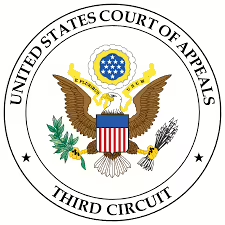From an interesting, unpublished, opinion of the U.S. Court of Appeals for the Third Circuit, McDowell v. Bayhealth Medical Center, Inc. The case itself was not that uncommon. It concerned a Title VII matter: the defendant required its employees to receive a COVID vaccine in order to work, with possible exemptions for religious or medical reasons. Plaintiffs objected that the requirement would, in the words of the majority, “be inconsistent with their religious beliefs, principally, their beliefs that their bodies are G-d’s temples.” The district court dismissed the Title VII complaint because it concluded that “Plaintiffs’ generalized references to scripture, their concerns were medical, scientific, personal, or secularin nature, rather than religious.” The three-judge panel affirmed, with the majority opinion written by Judge Patty Shwartz and Judge Paul Matey dissenting.
What interested me was the different views and attitudes toward religion in American law in the majority and dissenting opinions. Let’s start with the majority. First, I am not sure I have ever seen, in a judicial opinion, a reference to “G-d” before. Certain religious traditions (Judaism, for example, on some understandings) hold that God may not be named lest He be desecrated, on the basis of some verses from Deuteronomy. But it is, at the very least, unusual to see that view incorporated into a judicial opinion. By analogy, one does not regularly see, as far as I know, Muslim judges refer to God in judicial opinions by the term “the Prophet.” I thought the use of “G-d” particularly noteworthy because Plaintiffs themselves do not adopt that usage.
Second, on the merits, the majority holds that the Plaintiffs’ reliance on Scriptural passages to support their views was insufficient as a matter of law unless the Plaintiffs were able to “connect general religious beliefs with the conduct underlying the purported discrimination.” This is important, because it seems to require something much more than “sincerity.” The judges want to be persuaded, as a matter of argument, that the claims match up with real religious positions or tenets. They want to see “a sufficient nexus,” rather than a “secular” claim “cloak[ed] with religious significance.” This seems to me a good deal more scrutiny of religious claims than is sometimes typical. Not necessarily a bad thing, for reasons I have talked about elsewhere, though it is complicated.
Now to the dissent. Judge Matey’s view is quite different. Judge Matey notes that Plaintiffs came to their conclusions about the vaccine “[a]fter careful discernment, prayerfully seeking God, and reading [the] Bible.” Judge Matey argued that this is sufficient to survive a motion to dismiss, because Plaintiffs “ground their objections in Scripture. And they allege that prayer, discernment, and Scriptural study informed their decision.” It was inappropriate, he claimed, for the district court and the majority to evaluate the “centrality” of the beliefs to the claimed religious tradition.
In a footnote, Judge Matey also offers some observations about the concept of religion in American law:
The Complaint follows the guidelines of the Equal Employment and Opportunity Commission defining religion “to include moral ethical beliefs as to what is right and wrong which are held with the strength of traditional religious views.” 29 C.F.R. § 1605.1. That standard accepts decades of judicial decisions embracing a conception of religious liberty that prioritizes “inwardness, solipsism and absolute autonomy[.]” Marc. O. DeGirolami, The Sickness Unto Death of the First Amendment, 42 Harv. J. L. & Pub. Pol’y 751, 779–80 (2019). But it does not follow the traditional understanding of religion which “consists in offering service and ceremonial rites to a superior nature that men call divine.’” Thomas Aquinas, Summa Theologiae, II-II Q. 82, a. 1, s.c. (Aquinas Inst. ed., 2012) (quoting Marcus Tullius Cicero, Rhetoric, ii, 53); accord 2 James Madison, Memorial and Remonstrance Against Religious Assessments, in The Writings of James Madison 184 (Gaillard Hunt ed., 1901)(1785) (defining religion as “the duty which we owe to our Creator and the Manner of discharging it.”). This classical correlation between the organized practice of religion and the individual duty to God animated the Founding era, see generally, Vincent Philip Munoz, Religious Liberty and the American Founding (2022) and endured throughout the 19th century, see Davis v. Beason, 133 U.S. 333, 342, 10 S. Ct. 299, 300, 33 L. Ed. 637 (1890) (“The term ‘religion’ has reference to one’s views of his relations to his Creator, and to the obligations they impose of reverence for his being and character, and of obedience to his will.”), abrogated on other grounds by Romer v. Evans, 517 U.S. 620, 116 S. Ct. 1620, 134 L. Ed. 2d 855 (1996). Only recently have courts broadened “the definition of ‘religion’ to encompass more than formal doctrines of theology,” a move that would “push on eventually to a legal understanding of ‘religion’ that was virtually indistinguishable from ‘private beliefs’ of any kind.” Hadley Arkes, First Things: An Inquiry into the First Principles of Morals and Justice 192 (1986). That change in course, and its deviation from classical principles, deserves a deeper examination in a suitable case.
Fascinating to me, and not only because Judge Matey generously cites some of my work. Judge Matey is suggesting a tightening of the definition of religion at law, which would require a possible revaluation of lots of law (statutory and judicial). It is interesting that in this very case, given the breadth of the definition of religion, the positions of majority and dissent are not flipped on the merits. The majority is arguing for a more constrained definition, while the dissent (following, I think, the existing law) is arguing for a broader view. If Judge Matey is right that the definition of religion should be re-examined, would Plaintiffs win under that tighter standard? Too early to tell, probably, at this stage in the litigation.


